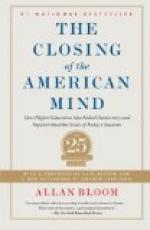XVII
THE DILEMMA OF DEMOCRACY
We have seen that the gravest menaces of democracy are the faults in mind and character in the multitude. Selfishness, fickleness, ignorance, irreverence in the people, with demagoguery in the leader— these are the menaces of American democracy. How then can the people be trusted, since democracy depends upon trusting them? This is an old indictment, searching to the very heart of democracy. Plato made it of ancient Athens, while, more recently and trenchantly, Ibsen has made it for all modern society.
The argument runs thus: democracy means the rule of the majority. Well, there are more fools than wise men in the world, more ignorant than intelligent. Thus the rule of the majority must mean the rule of the fools over the wise men, of the ignorant over the intelligent. Such is the significant indictment, and we are compelled to admit that our political life is filled with illustrations that would seem to substantiate it. The ward bosses, the demagogues and grafters who are given power by the multitude, one campaign after another, would seem to justify the pessimism of Plato and Ibsen.
Is there not, however, a subtle fallacy in the very phrasing of the indictment? The majority does not “rule”: it elects representatives who guide. That is something entirely different. When the worst is said of them those representatives of the people are distinctly above the average of the majorities electing them. Take the roll of our presidents, for instance. With all the corruption and vulgarity of our national politics, that list, from Washington, through such altitudes as Jefferson and Lincoln, to the present occupant of the White House, is superior to any roster of kings or emperors in the history of mankind.
What does this mean? It means that the hope of democracy is the instinctive power in the breast of common humanity to recognize the highest when it appears. Were this not true, democracy would be the most hopeless of mistakes, and the sooner we abandoned it, with its vulgarity and waste, the better it would be for us. The instinctive power is there, however: to recognize, not to live, the highest.
How many have followed the example of Socrates, remaining in prison and accepting the hemlock poison for the sake of truth? Yet all who know of him thrill to his sacrifice. Of all who have borne the name, Christian, how many have followed consistently the footsteps of Jesus and obeyed literally and unvaryingly the precepts of the Sermon on the Mount? Of the millions, perhaps ten or twenty individuals—to be generous in our view; but all the world recognizes him.




